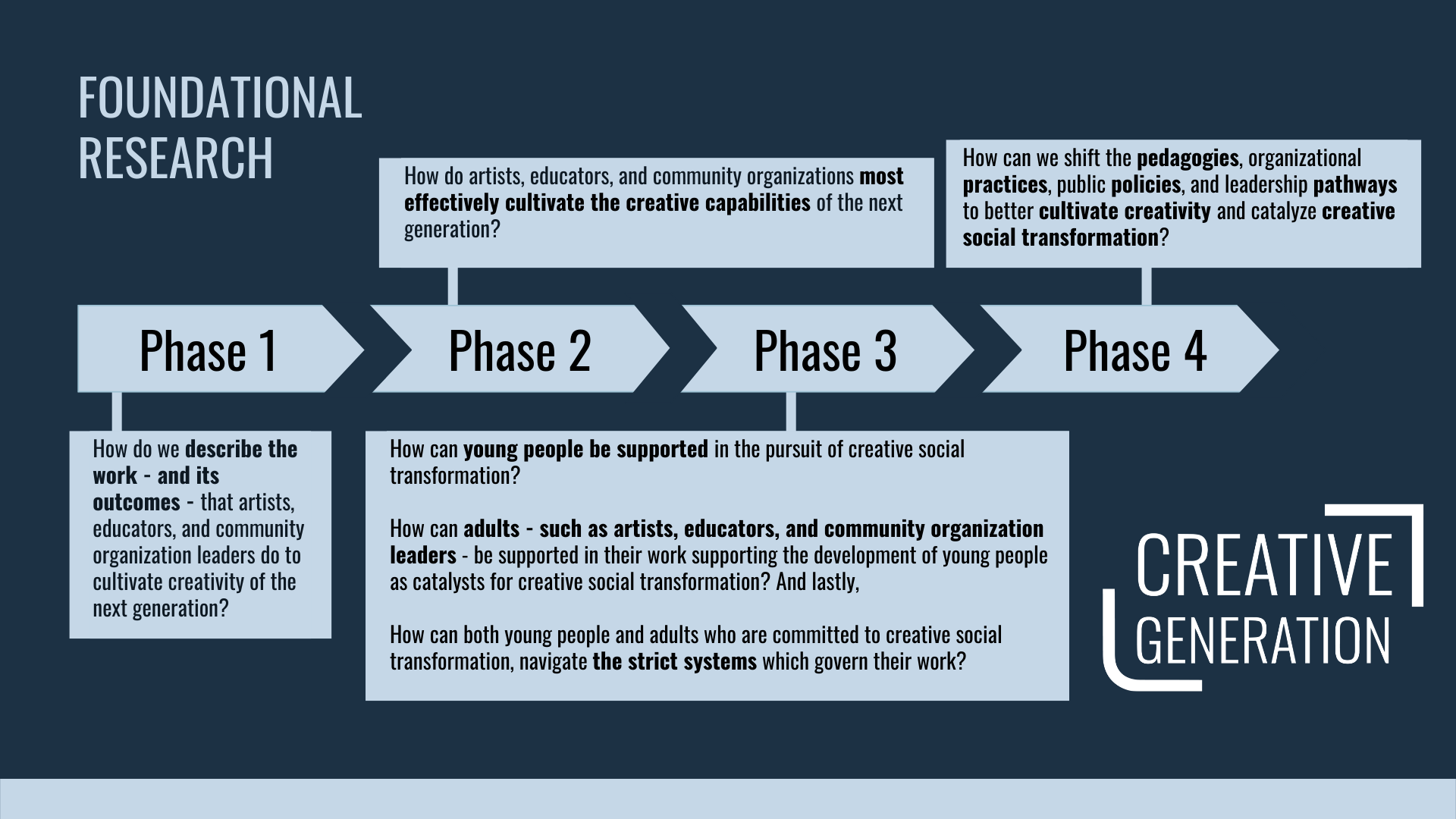Towards an Understanding of the Creative Generation
The Creative Generation - or Gen C, for short - is a term taken from consumer marketing and is used to describe an intergenerational group of people who care deeply about creativity, culture, connection, and community. After the youth response to complex global challenges, such as terrorism, climate change, and social divisiveness, we sought to understand how young creatives, the members of the creative generation, operate within their communities and the world.
In four phases from 2019 to present, we have systematically explored the central topic, producing documentation of community knowledge and diverse ways of knowing from both young creatives and those who cultivate their creativity.
First, we explored how practitioners, like artists, educators, and community organization leaders, describe the work they do - and its outcomes - to cultivate creativity in the next generation.
By conducting a literature review of the theoretical underpinnings of this work, an initial paper argues to move beyond the silos, which have enveloped the arts, culture and education fields, to comprehensively review the current methods of support for young people and those charged with their creative development. It challenges the dominant narratives in the United States about arts and cultural education and its proclaimed outcomes.
From a set of interviews with practitioners and organizational leaders of national prominence in the United States, we found was that a paradigm shift in vernacular was needed to both unify the field and better articulate the artistic, cultural, and creative processes which cultivate creativity in young people, because the field…
lacks a common language to describe its work and the intended outcomes, which leads to
severe isolationism among practitioners - such as artists, educators, and community organization leaders - resulting in insufficient communities of practice, which foments…
a stagnation of pedagogies, organizational practices, and pathways to leadership, due to a dearth of opportunities to exchange knowledge.
In a second inquiry, we extended our exploration, and returned to the literature (both traditional and nontraditional) to answer the question: How do artists, educators, and community organization leaders effectively cultivate the creative capabilities in the next generation?
What resulted was a series of essays re-conceptualizing the language of our intersectional fields of arts/culture, education, and social change and putting forward an enriched vocabulary for the “creative generation,” creative capabilities, and creative social transformation. This body of work concluded with a new set of research questions to be further explored:
How can young people be supported in the pursuit of creative social transformation?
How can adults - such as artists, educators, and community organization leaders - be supported in their work supporting the development of young people as catalysts for creative social transformation? And lastly,
How can both young people and adults who are committed to creative social transformation, navigate the strict systems which govern their work?
Through a series of 30 case studies in 24 nations, we employed a community-based participatory research approach to conduct systematic program reviews, interviews, and focus groups of over 100 individuals. From these discussions two additional paradigm shifts were identified:
A deeper integration of Policy-Pedagogy-Practice
A shift in organizational practices to view Cultural Institution as Civic Institution
These paradigms assert shifts in the practice and organizational infrastructure of the work at the intersection of arts/culture, education/youth development, and social justice.
In 2021, the growing Collective of Creative Generation synthesized this body of work and began to explore their inquiries through numerous large- and small-scale projects, each with a different focus. However, the Collective articulated its final research question to guide their work moving forward:
How can we shift the pedagogies, organizational practices, public policies, and leadership pathways to better cultivate creativity and catalyze creative social transformation?
Findings from this work can be found in our numerous projects and are shared through publications, blogs, and podcast episodes. Overarching learnings are translated into learning opportunities in the Academy for Creative Leadership and numerous other opportunities offered by our Collaborators.
Do you want to contribute to this research? Get in touch with us now!

